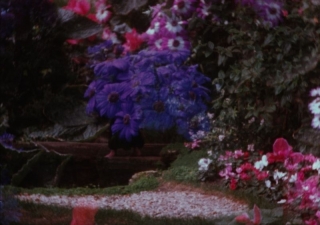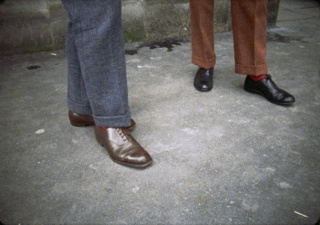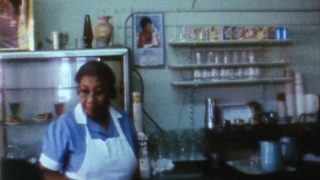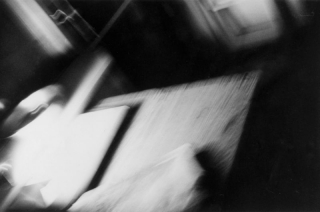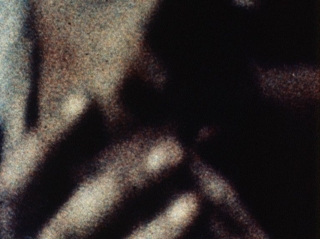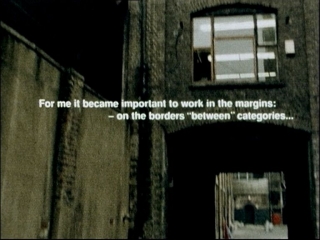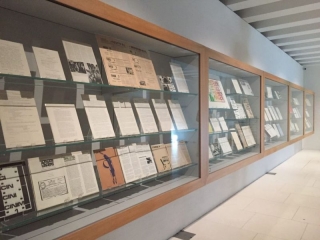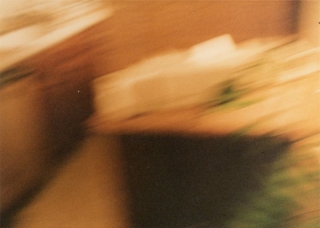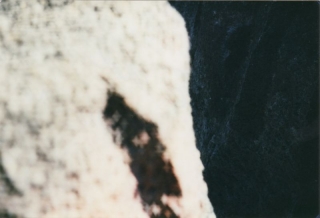Date: 23 May 2015 | Season: Gregory Markopoulos: Film as Film | Tags: Gregory Markopoulos
THE ILLIAC PASSION
Saturday 23 May 2015, at 8:15pm
Zurich Videoex Festival
Throughout his life, Markopoulos remained closely connected to his heritage and made many works that connected with ancient Greek culture. The Illiac Passion, one of his most highly acclaimed films, is a visionary interpretation of ‘Prometheus Bound’ starring mythical beings from the 1960s underground. The cast includes Jack Smith, Taylor Mead, Beverly Grant, Gregory Battcock and Gerard Malanga, and Andy Warhol appears as Poseidon riding an exercise bike. The extraordinary soundtrack of this re-imagining of the classical realm features a fractured reading (by the filmmaker) of Henry Thoreau’s translation of the Aeschylus text and excerpts from Bartók’s Cantata Profana. Writing about this erotic odyssey, Markopoulos asserted that, “the players become but the molecules of the nude protagonist, gyrating and struggling, all in love, bound and unbound, from situation to situation in the vast sea of emotion.”
Gregory J. Markopoulos, The Illiac Passion, 1964-67, USA, 16mm, colour, sound, 91 min
PROGRAMME NOTES
THE ILLIAC PASSION
Saturday 23 May 2015
Zurich Videoex Festival
THE ILLIAC PASSION
Gregory J. Markopoulos, USA, 1964-67, 16mm, sound, colour, 91 minutes
“Metamorphosis of the filmmaker. Passions of the filmmaker. Out of his breast the free flowing blood of the creation of a motion picture which depicts the passions of mankind and of everyman in general. The filmmaker selecting and offering to his actors the inheritance of themselves, transforming them through themselves, their own life’s scenario, onto the motion picture screen. A screen in which everything is both transfixed and changed. Not only the filmmaker undergoes changes, i.e. the creative endeavor, but his actors or non-actors, and everyone who associates himself with the very moments during which the filmmaker is working. In this case the greatest alteration taking place towards the film spectator. The new film spectator of the new cinema. […]
“Set afire, the soul of the film spectator and the mythic characters or real personalities of The Illiac Passion commence to alternate, sometimes obliterate and then return to a moment passed or forgotten. That moment taking on greater meaning (upon its return, second return or reference in the film – via single frames, clusters of frames, and the classic principles of film editing), the symbols, the individual psychology united in a single structure, i.e. The Illiac Passion. All revealing the same story, but in variation, all united, all invoking the passions, and all seen through the vibrant passion of the hero, Mr Richard Beauvais as the apotheosis of a Prometheus who is not to bound to a rock, but bound to his own passions; i.e. his own life’s scenario. And, all the various myths which the filmmaker uses in this development in The Illiac Passion become involved in that time development known as eternity.”
(Gregory J. Markopoulos, The Illiac Passion, 1967)
Back to top
Date: 24 May 2015 | Season: Gregory Markopoulos: Film as Film | Tags: Gregory Markopoulos
GREGORY J. MARKOPOULOS: EARLY FILMS OF THE 40s & 50s
Sunday 24 May 2015, at 6:30pm
Zurich Videoex Festival
Having made 8mm films as a child, Markopoulos sought to advance his knowledge of filmmaking by enrolling at the USC Film School, where he attended lectures by Joseph von Sternberg and observed productions of Fritz Lang, Alfred Hitchcock and Alexander Korda. His first 16mm film, Psyche, was made in Los Angeles at this time, concurrent with the first films by Curtis Harrington and Kenneth Anger. Abandoning his studies after only three semesters, he returned to his hometown of Toledo, Ohio, and completed some half dozen films. These early works often explore themes of sexual awakening and the anxiety of coming to terms with homosexuality in an age of repression. In the mid-1950s, the filmmaker embarked on the ill-fated feature Serenity in Greece before re-emerging with Twice a Man (1963), the work that secured Markopoulos’ position as one of independent cinema’s leading figures.
Gregory J. Markopoulos, Psyche, 1947, 24 min
Gregory J. Markopoulos, Christmas-USA-1949, 1950, 13 min
Gregory J. Markopoulos, Eldora, 1953, 11 min
Gregory J. Markopoulos & Robert C. Freeman, Swain, 1950, 20 min
PROGRAMME NOTES
GREGORY J. MARKOPOULOS: EARLY FILMS OF THE 40s & 50s
Sunday 24 May 2015
Zurich Videoex Festival
PSYCHE
Gregory J. Markopoulos, 1947, USA, 16mm, color, sound, 24 min
Psyche, which takes as its source an unfinished novella of the same name by Pierre Louÿs, is a remarkably ambitious and sensual work for a 19-year old to have made in the late 1940s – addressing themes of eros and lesbianism, and containing sequences of montage that presage the techniques of rapid editing that advance in later works. Psyche can stand alone, but was also shown together with Lysis and Charmides (both made in Toledo the following year, inspired by Platonic dialogues) in the trilogy Du sang de la volupte et de la mort (1947-48).
“The first thing which I did was to delete the novelette of its lush rhetoric and retain only its symbolic color. In Psyche, color plays an important role, similar to the role which color plays in the paintings of Toulouse Lautrec. Color reflects the true character of the individual before us, whether it be on the screen, in a painting, or in the street. Color is Eros.” (Gregory J. Markopoulos, Psyche’s Search for the Herb of Invulnerability, 1955)
CHRISTMAS-USA-1949
Gregory J. Markopoulos, 1950, USA, 16mm, b/w, sound, 13 min
Having abandoned his studies at USC, Markopoulos returned to Ohio and completed some half dozen films before shooting the feature film Serenity in Greece. Christmas-USA-1949 (aka Christmas USA) weaves together documentary and fiction to convey a moment of awakening, and was shot at the ‘Cavalcade of Amusements’ travelling fairground, and in the Markopoulos family home and local surrounds.” Its closing credits declare “the end of a period.”
ELDORA
Gregory J. Markopoulos, 1953, USA, 16mm, color, silent, 11 min
“The dreamlike Eldora describes love’s fragmenting effects on the consciousness of an adolescent girl.” (Kristin M. Jones). Eldora was shot on 8mm stock given to the filmmaker by the LA-based exhibitor and collector Raymond Rohauer, and is dedicated to Robert C. Freeman, his collaborator on Swain. In his writings, Markopoulos refers to the film’s “cautious and excruciatingly slow movement” and describes its heroine “proceeding as if with lunar strides across the wet, soft, earthly shore matter of the Maumee River.”
SWAIN
Gregory J. Markopoulos & Robert C. Freeman, 1950, USA, 16mm, color, sound, 20 min
“An exquisite early psychodramatic trance film reminiscent of Maya Deren’s films, Swain is loosely inspired by Nathaniel Hawthorne’s Fanshawe and is rich in metaphor. Starring Markopoulos, Swain is an evocation in gentle images and visual symbols of a subconscious rejection of the stereotyped masculine role that both society and women insist upon. This rejection takes the form of escape – a flight in fantasy from what is visually perceived as crude, repelling sexuality into the purity of creative activity, of nature, and of the individual personality left inviolate.” (Donald Weinstein, Swain: Flowers and Flight, 1963)
Back to top
Date: 25 October 2015 | Season: Gregory Markopoulos: Film as Film | Tags: Gregory Markopoulos
GREGORY J. MARKOPOULOS
Sunday 25 October 2015, at 3:45pm
Lisbon Doclisboa at Culturgest
Figura ímpar na história do cinema, Markopoulos abandonou os Estados Unidos, depois de ter sido uma das figuras cimeiras do New American Cinema, vindo, inclusivamente, a retirar os seus filmes de circulação. Na última década da sua vida, dedicou-se a rever e a reeditar os seus filmes desde finais dos anos 1940, num projecto de 80 horas, Eniaios (palavra grega, significan- do “carácter único” e “unidade”), ciclo que, enquanto tal, e como um ritual, se destina a ser visto cada quatro anos, num sítio único, Temenos.
Gregory J. Markopoulos, Gilbert and George (ENIAIOS III – Reel 1), 1975/1989-91, 12 min
Markopoulos retratou artistas como Moravia, Nureyev ou De Chirico. Este retrato da dupla Gilbert & George é marcado pela ausência da imagem interrompida por fragmentos dos corpos destas duas esculturas vivas, e pela ausência de movimento.
Gregory J. Markopoulos, Genius (ENIAIOS – Reels 2, 3, 4), 1970/1989-91, 80 min
Um retrato triplo, inspirado na lenda de Fausto, do artista britânico David Hockney, do pintor surrealista argentino Leonor Fini e do comerciante de arte Daniel-Henry Kahnweiler. Com uma estrutura calculada, Genius constitui a secção central de Eniaios III.
Projecção precedida da apresentação do livro Film as Film: The Collected Writings of Gregory J. Markopoulos, organizado por Mark Webber, com um prefácio de P. Adams Sitney e publicado por The Visible Press (2014).
Date: 15 January 2016 | Season: Little Stabs at Happiness
LITTLE STABS AT HAPPINESS
Friday 15 January 2016, at 8pm
London Short Film Festival at the ICA Theatre
A revival of Little Stabs at Happiness, the legendary music and film club presented by Mark Webber at the ICA from 1997 to 2000. Early evening experimental films and contemporary music will be followed by a rare screening of The Savage Eye, all shown on 16mm film, just the way it should be. When the credits roll, the volume rises, as original Little Stabs DJs and special guests spin disco anthems, new wave big beats and smash hits of yesteryear.
8pm: Quiet Music & Underground Movies
Thom Andersen, Olivia’s Place, 1966, 16mm, 6 min
Lewis Klahr, Pony Glass, 1998, 16mm, 15 min
Laida Lertxundi, My Tears Are Dry, 2009, 16mm, 4 min
9.30pm: Feature Film
Ben Maddow, Sydney Meyers & Joseph Strick, The Savage Eye, 1960, 68 min
A single woman tours the seedy underbelly of Los Angeles, searching for hope but seeing only despair.
11pm: Music & Dancing
Real songs with a beat you can dance to.
Date: 16 March 2016 | Season: Peter Gidal: Flare Out
PETER GIDAL: CLOSE UP
Wednesday 16 March 2016, at 7pm
Newcastle AV Festival at Northern Carter
This rare screening of Peter Gidal’s ‘feature length’ film Close Up (1983) anticipates the publication of Flare Out: Aesthetics 1966–2016, a collection of essays by one of film’s great polemicists. Gidal was a central figure during the formative years of the London Film-Makers’ Co-operative, whose 50th anniversary is being celebrated throughout 2016, and made some its most radical works. His cinema is anti-narrative, against representation and fiercely materialist. In Close Up, Gidal’s political, ultra-leftist practice is augmented by the disembodied voices of Nicaraguan revolutionaries heard of the soundtrack.
Peter Gidal, Close Up, 1983, 70 min
The programme will be introduced by Mark Webber.
PROGRAMME NOTES
PETER GIDAL: CLOSE UP
Wednesday 16 March 2016, at 7pm
Newcastle AV Festival at Northern Carter
CLOSE UP
Peter Gidal, 1983, 16mm, colour, sound, 70 min
“After three years this film, attempting yet again to deal with the problematizing of filmic representation in sound and image: the overtly politically-polemical soundtrack from Nicaragua must not synchronise with, nor must it find a separate continuum of reality away from, the image sequences.
“Without avoiding the interrogation of narrative/anti narrative cinematic structures (the way the images, and the sounds, at times hold/do not hold … or the way they attempt to force a position contradictory to any representational imaginary or homogeneity, of constructed space, time, ego, language, film) an attempted materialist use of sound and image must be at the same time an anti-individualist work.
“Both the sound-contradictions, and the image-contradictions, of subjectivity in this film (and of this film) must be in constant process with/against the political polemic: the film can not allow for a final exclusion of either (neither some pure documentary reality nor some pure formal dialectic). The viewer’s attempts, via her/his/the cultural context of meaning making (political/sexual, narrative) are worked against by the film’s process. The work against the capitalist patriarchal position of narrative, in other words, is (still, and in specificity) the main interest.”
—Peter Gidal, August 1983
Back to top
Date: 10 April 2016 | Season: Shoot Shoot Shoot 2016 | Tags: Shoot Shoot Shoot
SHOOT SHOOT SHOOT
Sunday 10 April 2016, at 3pm
St. Ives Porthmeor Studios
An afternoon of screenings celebrating the first decade of the London Film-Makers’ Co-operative (1966–76), the predecessor of LUX. The LFMC was founded in October 1966 as a non-commercial distributor of avant-garde cinema. In contrast to similar groups that emerged around the world, it grew to incorporate a distribution service, cinema space and film laboratory. Within this unique facility, filmmakers were able to control every aspect of the creative process. Many explored the material aspects of celluloid, whilst others experimented with multiple projection and performance-based ‘expanded cinema’. Despite the physical hardship of its survival, this artist-led organisation asserted the significance of British work internationally, and anticipated today’s vibrant culture of artists’ moving image. The early history of the LFMC will be documented in a display of films and ephemera in the Archive Gallery at Tate Britain (25 April to 17 July 2016), and a book will be published by LUX this autumn.
3pm
Guy Sherwin, At The Academy, 1974, 5 min
Marilyn Halford, Footsteps, 1974, 6 min
Peter Gidal, Key, 1968, 10 min
Annabel Nicolson, Slides, 1970, 12 min (18fps)
Malcolm Le Grice, Berlin Horse, 1970, 8 min
Lis Rhodes, Dresden Dynamo, 1974, 5 min
Chris Garratt, Romantic Italy, 1975, 8 min
John Smith, Associations, 1975, 7 min
5pm
William Raban & Chris Welsby, River Yar, 1971–72, 35 min (double screen projection)
Curated and presented by Mark Webber.
Date: 14 April 2016 | Season: Peter Gidal: Flare Out
PETER GIDAL: FLARE OUT — SCREENING AND BOOK LAUNCH
Thursday 14 April 2016, at 7pm
London Tate Britain
A screening of four films by Peter Gidal to celebrate the publication of Flare Out: Aesthetics 1966–2016, a collection of his essays on film, art and aesthetics. Gidal was a central figure during the formative years of the London Film-Makers’ Co-op and made some its most radical works. His cinema is anti-narrative, against representation and fiercely materialist, and his writings are similarly polemical and unique. This programme of films from the 1960s to the present includes his most recent work, and will be introduced by Mark Webber and Peter Gidal.
Peter Gidal, Assumption, 1997, 1 min
Peter Gidal, Key, 1968-69, 10 min
Peter Gidal, Kopenhagen/1930, 1977, 40 min
Peter Gidal, not far at all, 2013, 15 min
“He draws out singularities. He allows the camera only a fenced in area, piecemeal. He lets the gaze hold on objects and constantly repeats … this permits the possibilities of the discrepancies between one’s own seeing and seeing with the camera to become distinct, and this in turn allows for a completely different experience of the surroundings.” (Birgit Hein)
Flare Out: Aesthetics 1966–2016, edited by Mark Webber and Peter Gidal, is published by The Visible Press.
PROGRAMME NOTES
PETER GIDAL: FLARE OUT — SCREENING AND BOOK LAUNCH
Thursday 14 April 2016, at 7pm
London Tate Britain
ASSUMPTION
Peter Gidal, 1997, 16mm, colour, sound, 1 min
Assumption features glimpses of life at the London Film-Makers’ Co-op; but is more than a potted history of an organisation. It pays tribute to Mary Pat Leece, a founding member of Four Corners Film Workshop and a teacher at Chelsea and Saint Martins Schools of Art, one of the true innovators of the independent film sector. With its virtuoso editing, voice-overs and scrolling titles, it works as a densely-plotted celebration of independent film culture at the end of the 1990s.
KEY
Peter Gidal, 1968-69, 16mm, colour, sound, 10 min
A slow zoom-out and image dissolve (defocus) of … (+feedback sound).
KOPENHAGEN/1930
Peter Gidal, 1977, 16mm, b/w, silent, 40 min
Kopenhagen/1930 presents a different attitude to the seductions of content, to the signifying processes that are repressed in the rigorous procedures of the Structural/Materialist film. Its material is ‘images by George Gidal, Copenhagen 1930’: photographs, their grounding and their signification.
NOT FAR AT ALL
Peter Gidal, 2013, 16mm, colour, sound, 15 min
First film in 5 years, tempted to say different yet the same, but not. not far at all’s soundtrack, just for the record, is concrete/abstract without language.
Back to top
Date: 25 April 2016 | Season: Shoot Shoot Shoot 2016 | Tags: Shoot Shoot Shoot
SHOOT SHOOT SHOOT: THE LONDON FILM-MAKERS’ CO-OPERATIVE 1966-76
25 April—17 July 2016
London Tate Britain Archive Gallery
This display traces the first decade of the London Film-Makers’ Co-operative through a selection of documents, ephemera and films from the period. The LFMC was founded in October 1966 as a non-commercial distributor of avant-garde cinema. In contrast to similar groups that emerged around the world, it grew to incorporate a distribution service, cinema space and film laboratory. Within this unique facility, filmmakers were able to control every aspect of the creative process. Many explored the material aspects of celluloid, whilst others experimented with multiple projection and performance-based ‘expanded cinema’. Despite the physical hardship of its survival, this artist-led organisation asserted the significance of British work internationally, and contributed towards today’s vibrant culture of artists’ moving image.
Curated by Mark Webber. Presented by LUX in association with the British Artists’ Film and Video Study Collection. With thanks to Inga Fraser, David Curtis, Steven Ball, Alejandro Fernandez Moreno, Peter Gidal, William Cobbing and the Cobbing Family Archive.
Date: 20 May 2016 | Season: Peter Gidal: Flare Out
PETER GIDAL: CLOSE UP
Friday 20 May 2016, at 7:30pm
London Close-Up Film Centre
Peter Gidal and Mark Webber will introduce a screening of Gidal’s ‘feature length’ film Close Up (1983) to coincide with the publication of Flare Out: Aesthetics 1966–2016, a collection of essays by one of film’s great polemicists. Gidal was a central figure during the formative years of the London Film-Makers’ Co-operative and made some its most radical works. His cinema is anti-narrative, against representation, and fiercely materialist.
“Close Up is crystal hard, intransigent, and film in extremis. In short, one of the best ‘political’ films made in this country.” —Michael O’Pray, Monthly Film Bulletin
In Close Up, Peter Gidal’s political, ultra-leftist practice is augmented by the disembodied voices of two Nicaraguan revolutionaries heard of the soundtrack. These voices punctuate a film whose representation of a room, an inhabited space, is one in which the viewer must consciously search for recognition, for meaning-making. The image-content is muted and abstract, but fascinating, with moments of (no-doubt) inadvertent beauty.
Presented in association with LUX.
Date: 25 May 2016 | Season: Peter Gidal: Flare Out
PETER GIDAL: FLARE OUT — SCREENING AND BOOK LAUNCH
Wednesday 25 May 2016, at 7pm
Paris Centre Pompidou
For five decades, Peter Gidal has sought to problematise the film-viewing process by creating works that resist recognition and identification. His practice posits film as a durational experience and negates analysis on psychological grounds. This programme, featuring the seminal film Clouds (1969) and later works Flare Out (1992), Volcano (2002) and not far at all (2013), surveys his radical and unique approach.
Peter Gidal, Clouds, 1969, 10 min
Peter Gidal, Flare Out, 1992, 20 min
Peter Gidal, Volcano, 2002, 30 min
Peter Gidal, not far at all, 2013, 15 min
Gidal has been based in the UK since the late 1960s, and was a central figure during the formative years of the London Film-Makers’ Co-operative. He is a noted writer and polemicist, whose “Theory and Definition of Structural/Materialist Film” is a key text of avant-garde cinema. The screening celebrates the publication of Flare Out: Aesthetics 1966–2016, a collection of Gidal’s essays on film, art and aesthetics, and will be introduced by the filmmaker and editor/publisher Mark Webber.
“Mental activation toward material analysis is the process that is relevant, whether or not actual structure is ‘revealed’.” —Peter Gidal, 1969
PROGRAMME NOTES
PETER GIDAL: FLARE OUT — SCREENING AND BOOK LAUNCH
Wednesday 25 May 2016, at 7pm
Paris Centre Pompidou
CLOUDS
Peter Gidal, 1969, 16mm, b/w, sound, 10 min
The anti-illusionist project engaged by Clouds is that of dialectical materialism. There is virtually nothing on screen, in the sense of in screen. Obsessive repetition as materialist practice not psychoanalytical indulgence. (PG)
FLARE OUT
Peter Gidal, 1992, 16mm, colour, sound, 20 min
Sound: unrecognition unidentified, in time, you hear? Image: recognition identified, out of time in time; not not knowing the unknown but not knowing the known, no trace of ‘no trace of any thing’. e.g. grain: is grain silver, black & white, or colour? Is silver black & white or colour? You see? (PG)
VOLCANO
Peter Gidal, 2002, 16mm, b/w & colour, silent, 30 min
The film attempts to deal with those questions of representation that persist as problematic, for me, for the basic questions of aesthetics, what it is to view, how to view the unknown, as to view the known is not possibly a viewing. The question of recognition, the impossibility of recognition or, better said, the impossibility of a viewer viewing at all if it is predicated upon recognition … At that moment, you the viewer I the viewer am no longer part of a process, a material however metaphysical or not process of making meaning through the conflicts of perception of something … In Volcano light’s afterimage, the shot of light after image, becomes as obliterative as dark’s … Thereby the temporal break caused by transparent leader, and by black leader, becomes differently spatial and temporal, as to the “something missing”… (PG)
not far at all
Peter Gidal, 2013, 16mm, colour, sound, 15 minutes
First film in 5 years, tempted to say different yet the same, but not. not far at all’s soundtrack, just for the record, is concrete/abstract without language. (PG)
Back to top
